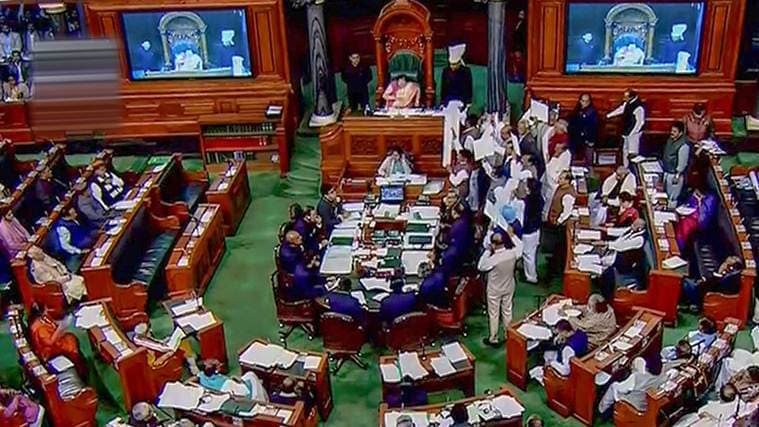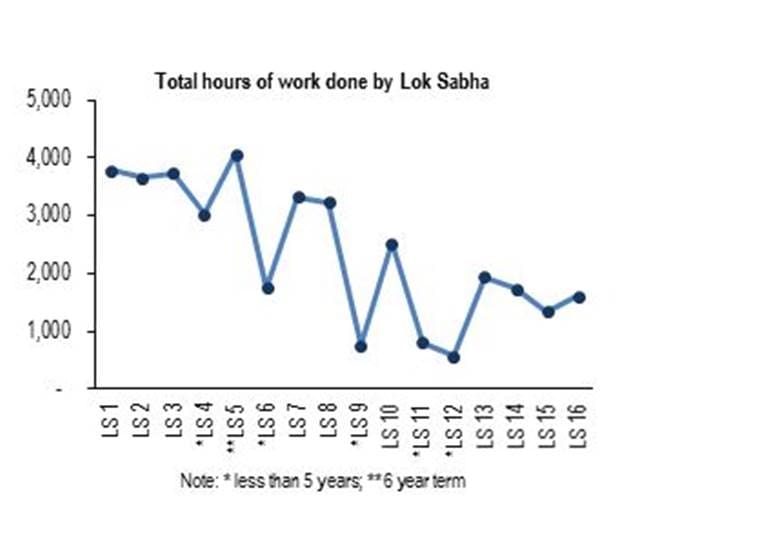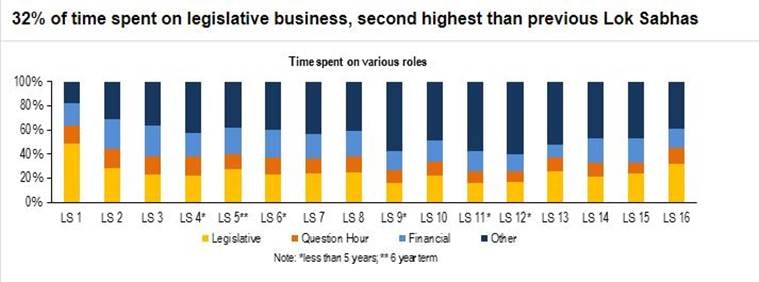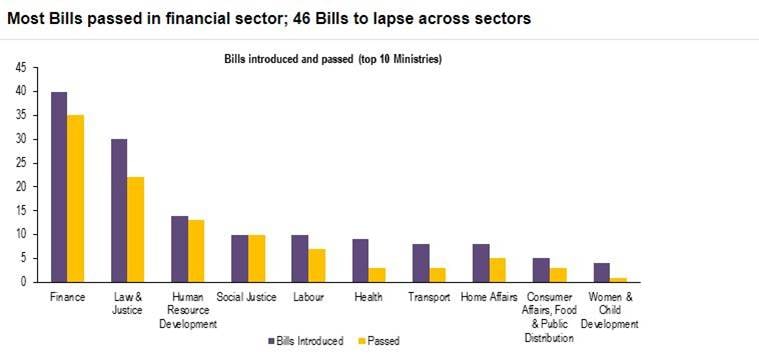
The 16th Lok Sabha that held its sessions between June 2014 and February 2019, passed 133 bills and worked for a total of 1,615 hours, the second lowest by a House that completed a full-term, an analysis by PSR India revealed.
The 16th Lok Sabha spent 40 per cent less time than the average number of hours (2,689) spent by previous Lower Houses that completed full-term. Disruptions and adjournments also took up most of its time with issues ranging from agrarian crisis, inflation and the Rafale deal, taking centre stage on different occasions.

This Lok Sabha lost 16 per cent of its scheduled time to disruptions, better than the 15th Lok Sabha (37 per cent), but worse than the 14th Lok Sabha (13 per cent). The budget session of 2018-19 ended in total Parliament washout, with the latter half of the session ending in adjournments, becoming the least productive parliamentary session in 18 years.
The 16th Lok Sabha also witnessed disruptions over contentious bills, including the Citizenship (Amendment) Bill, 2019 and the Triple Talaq bill, reverberations of which were felt across party lines outside Parliament.
The quota bill became a law after being passed in both houses of Parliament, amid much debate over its introduction ahead of the 2019 Lok Sabha elections.
No-Confidence motion
Since the first Lok Sabha, a no-confidence motion against the ruling party has been moved 27 times. In the 16th Lok Sabha, the motion was moved only once — by NDA’s former ally TDP in the lower house. After a discussion that lasted 11 hours and 46 minutes, the motion was defeated.
Key bills
Twenty-six of the bills passed in the 16th Lok Sabha were related to the financial sector, including the GST Bill, the Bankruptcy Code, the Insurance Amendment bill and the Fugitive Economic Offenders bills.
The 16th Lok Sabha spent 32 per cent of its time on legislative business, higher than the average of other Lok Sabhas (25 per cent).

Forty-six bills, including the contentious Citizenship (amendment) bill, 2019, and The Muslim Women (Protection of Rights on Marriage) Bill, 2018 have lapsed with the dissolution of the 16th Lok Sabha.
The provision regarding lapse of a Bill in the Rajya Sabha Legislative Procedure states: “A Bill pending in Rajya Sabha which has not been passed by Lok Sabha does not lapse on the dissolution of Lok Sabha but a Bill which is passed by Lok Sabha and is pending in Rajya Sabha lapses on the dissolution of Lok Sabha.”

The National Medical Commission Bill, the Consumer Protection Bill, the Motor Vehicles Bill, and the Trafficking Bill have also lapsed.
Most bills tabled in Parliament in the 16th Lok Sabha evaded scrutiny, with only 25 per cent of those bills being sent to Committees, much lower than 71 per cent and 60 per cent in the 15th and 14th Lok Sabha respectively. However, discussions in the House claimed more time than previous Lok Sabhas. Thirty-two per cent of the bills were discussed for more than three hours in Parliament, higher than the previous two Lok Sabhas (22 per cent and 14 per cent in the 15th and 14th Lok Sabha respectively). Bills passed within 30 minutes also decreased from 26 per cent in the 15th Lok Sabha to 6 per cent in the 16th Lok Sabha.
And all proposals made in the union budget 2018-19 were passed undebated. At the last day of the 16th Lok Sabha Wednesday, the Rajya Sabha also passed the interim budget of 2019-20 without debate.
All data PRS Legislative Research.